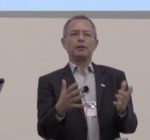Sometimes, vendors just won’t take customers’ money for a cluster no matter how hard the customer pleads. Last month, HPC technology strategist Ryan Quick, co-founder and principal at Providentia Worldwide consulting firm, told us that while vendors have technologies capable of delivering solutions across the stack, too often they have disconnects between business units that makes buying an integrated solution difficult, if not impossible. In this interview, Quick expands on those comments with problem scenarios and advice on handling vendors.
Prying an Integrated HPC Cluster from Vendors’ Hands: ‘We Had to Force Them to Get into the Same Room’
Applying Cloud Techniques to Address Complexity in HPC System Integrations
Arno Kolster from Providentia Worldwide gave this talk at the HPC User Forum. “OLCF and technology consulting company Providentia Worldwide recently collaborated to develop an intelligence system that combines real-time updates from the IBM AC922 Summit supercomputer with local weather and operational data from its adjacent cooling plant, with the goal of optimizing Summit’s energy efficiency. The OLCF proposed the idea and provided facility data, and Providentia developed a scalable platform to integrate and analyze the data.”
High Performance Systems: An “Open Plan” for HPC
In this special guest feature from the SC19 Blog, Ryan Quick from Providentia Worldwide calls for a conference program that reflects more sharing across disciplines. “For me, HPC is about delivering answers to hard questions – right now. It’s about an inclusive and integrative approach to computing. And it’s exciting. If we can put aside our differences and allow ourselves to learn a little. We will gain a lot. I promise. See you in Denver.”
High Availability HPC: Microservice Architectures for Supercomputing
Ryan Quick from Providentia Worldwide gave this talk at the Stanford HPC Conference. “Microservices power cloud-native applications to scale thousands of times larger than single deployments. We introduce the notion of microservices for traditional HPC workloads. We will describe microservices generally, highlighting some of the more popular and large-scale applications. Then we examine similarities between large-scale cloud configurations and HPC environments. Finally we propose a microservice application for solving a traditional HPC problem, illustrating improved time-to-market and workload resiliency.”
Machine & Deep Learning: Practical Deployments and Best Practices for the Next Two Years
Arno Kolster from Providentia Worldwide gave this talk at the HPC User Forum in Milwaukee. “Providentia Worldwide is a new venture in technology and solutions consulting which bridges the gap between High Performance Computing and Enterprise Hyperscale computing. We take the best practices from the most demanding compute environments in the world and apply those techniques and design patterns to your business.”







